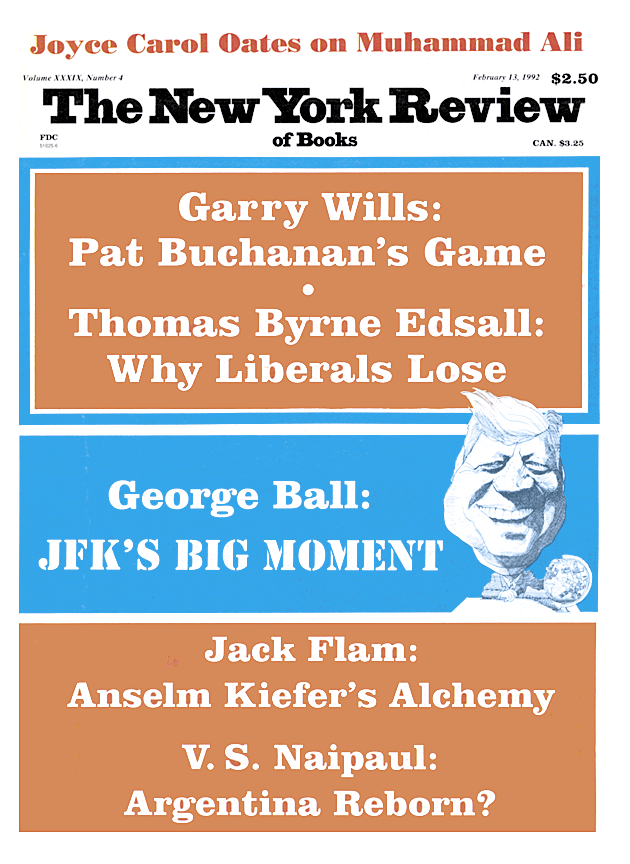In response to:
Twin Peaks from the December 5, 1991 issue
To the Editors:
Call me picky if you like, but Derek Jarrett’s otherwise excellent review contains one small inaccuracy. Mr. Jarrett states that “Virgil enjoyed a posthumous special relationship with the Christian world, having acted as guide to Petrarch’s contemporary Dante when he toured Hell and Purgatory and Heaven.”
In truth, Virgil never makes it to Heaven. He disappears in Canto XXX of Purgatory when Dante, the pilgrim, turning to his guide to express his overpowering emotions on seeing Beatrice, finds him no longer there!
Virgil, Reason itself, was not fated for such heights. No, something more is needed for the final attainment—a simple lesson, really, but so easily ignored.
Eduardo R. Tenenbaum
New York City
Derek Jarrett replies:
Having allowed his publishers to say of his book that “scholars and students of intellectual history and early modern European history and literature will want to read it,” Joseph Levine must consider how best to attract such readers. I don’t think he will do it by vilifying a reviewer who has taken the trouble to set his work in its European context and relate it to some of the broader themes of intellectual history. Nor will he win unqualified respect from scholars and students in this or any other field until he learns to pay more attention to those details that distinguish the meticulous from the slipshod. Although in my review I for-bore to mention such things lest I be thought unfair. I could not then and I cannot now understand why he cites the Sloane Manuscripts and the Stowe Manuscripts and the Additional Manuscripts as being in the British Museum rather than in the British Library. Is he dredging up material gathered long ago and forgetting to update his references or does he think that accurate citing of sources in unimportant? If the former then the only harm done is to his own reputation as a scholar; but if the latter then any students whose work he is permitted to supervise should be warned not to let his slovenly habits rub off on them.
We should now consider who is to apologize to whom and for what. I for my part owe your readers an apology for saying that Virgil accompanied Dante to Heaven as well as to Hell and to Purgatory. I am grateful to Eduardo R. Tenenbaum for pointing out this mistake. Levine seems not to have noticed it, presumably because Dante forms part of that wider context into which he will not allow his work to be set. But he can hardly have failed to notice that in the original version of his letter, sent to me at the end of last year together with an invitation to reply to it, he accused me of attributing to him “a quotation that is nowhere to be found in the book.” This is a serious charge to bring against a reviewer and so I suggested that the editors find out what the quotation was. The result of their inquiries is the revised letter now before us, in which the allegation is quietly dropped but no regrets are expressed for its having been made. Meanwhile Levine persists in describing me as “an obstinate reviewer who will probably be given the last word.” I very much hope that the last word will come from him and that it will be an apology not only for the groundless accusation about the invented quote but also for his equally groundless and extraordinarily petulant insinuations to the effect that I am in the habit of selling off review copies without looking at them. I can assure him that all the books I have reviewed during the past twenty years are still on my shelves and that each has a sheaf of notes tucked into it. The size of the sheaf depends on the nature of the book. Books that are lucid and well written need only the minimum of annotation but turgid and indigestible books have to be read over and over again and extensive notes taken. The thickest sheaf so far is the one tucked into Levine’s book.
This Issue
February 13, 1992


